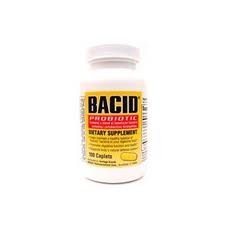What is Bacid (Lactobacillus Acidophilus)?
 Lactobacillus acidophilus is a bacteria that exists naturally in the body, primarily in the intestines and the vagina. Lactobacillus acidophilus helps maintain an acidic environment in the body, which can prevent the growth of harmful bacteria.
Lactobacillus acidophilus is a bacteria that exists naturally in the body, primarily in the intestines and the vagina. Lactobacillus acidophilus helps maintain an acidic environment in the body, which can prevent the growth of harmful bacteria.
Lactobacillus acidophilus has been used to treat or prevent vaginal yeast infections, yeast infections of the mouth, diarrhea caused by taking antibiotics, and urinary tract infections. Lactobacillus acidophilus may work by helping the body maintain normal consistency of bacteria in the stomach, intestines, and vagina.
Lactobacillus acidophilus has not been approved by the FDA to treat any disease, and it should not be substituted for prescription medications.
Lactobacillus acidophilus has not been evaluated by the FDA for safety, effectiveness, or purity. All potential risks and/or advantages of lactobacillus acidophilus may not be known. Additionally, there are no regulated manufacturing standards in place for these compounds. Some marketed herbal supplements have been found to be contaminated with toxic metals or other drugs. Herbal/health supplements should be purchased from a reliable source to minimize the risk of contamination.
Lactobacillus acidophilus may also have be used for other purposes not listed in this product guide.
What is the most important information I should know about Bacid (Lactobacillus Acidophilus)?
Lactobacillus acidophilus has not been approved by the FDA to treat any disease, and it should not be substituted for prescription medications.
Lactobacillus acidophilus has not been evaluated by the FDA for safety, effectiveness, or purity. All potential risks and/or advantages of lactobacillus acidophilus may not be known. Additionally, there are no regulated manufacturing standards in place for these compounds. Some marketed herbal supplements have been found to be contaminated with toxic metals or other drugs. Herbal/health supplements should be purchased from a reliable source to minimize the risk of contamination.
Talk to your doctor before taking lactobacillus acidophilus if you have any other medical conditions, allergies, or if you take other medicines or herbal/health supplements. Under certain conditions, it may be dangerous for you to take lactobacillus acidophilus.
Do not take lactobacillus acidophilus without first talking to your doctor if you are pregnant or may become pregnant during treatment.
Do not take lactobacillus acidophilus without first talking to your doctor if you are breast-feeding a baby.
Do not give any herbal/health supplement to a child without the advice of a doctor.
What should I discuss with my healthcare provider before taking Bacid (Lactobacillus Acidophilus)?
Talk to your doctor before taking lactobacillus acidophilus if you have any other medical conditions, allergies, or if you take other medicines or herbal/health supplements. Under certain conditions, it may be dangerous for you to take lactobacillus acidophilus.
Do not take lactobacillus acidophilus without first talking to your doctor if you are pregnant or may become pregnant during treatment.
Do not take lactobacillus acidophilus without first talking to your doctor if you are breast-feeding a baby.
Do not give any herbal/health supplement to a child without the advice of a doctor.
Bacid Side Effects
What are the possible side effects of Bacid (Lactobacillus Acidophilus)?
Get emergency medical help if you have any of these signs of an allergic reaction: hives; difficulty breathing; swelling of your face, lips, tongue, or throat.
Less serious side effects may be more likely, and you may have none at all.
Tell your doctor, pharmacist, herbalist, or other healthcare provider about any unusual or bothersome side effect. You may report side effects to FDA at 1-800-FDA-1088.
Bacid Interactions
What other drugs affect Bacid (Lactobacillus Acidophilus)?
There may be other drugs that can interact with lactobacillus acidophilus. Tell your healthcare provider about all the prescription and over-the-counter medications you use. This includes vitamins, minerals, herbal products, and drugs prescribed by other doctors. Do not start using a new medication without telling your healthcare provider.
What should I avoid while taking Bacid (Lactobacillus Acidophilus)?
Follow your doctor’s instructions about any restrictions on food, beverages, or activity while you are using lactobacillus acidophilus.
Bacid Dosage
How should I take Bacid (Lactobacillus Acidophilus)?
When considering the use of herbal supplements, seek the advice of your doctor. You may also consider consulting a practitioner who is trained in the use of herbal/health supplements.
Do not take more of this product than is directed.
If you choose to take lactobacillus acidophilus, use it as directed on the package or as directed by your doctor, pharmacist, or other healthcare provider. Do not use more of this product than is recommended on the label.
Lactobacillus acidophilus is available in capsule and tablet form. Powder or liquid forms may also be available. Some dairy products, especially yogurt, also contain lactobacillus acidophilus.
Do not use many different forms (such as tablets, topical formulations, and others) of lactobacillus acidophilus at the same time, unless your healthcare professional has told you to. You may get too much of this product if you use different forms together.
Store lactobacillus acidophilus in a sealed container as directed on the product label, away from moisture, heat, and light.
What happens if I overdose on Bacid (Lactobacillus Acidophilus)?
Seek emergency medical attention or call the Poison Help line at 1-800-222-1222.
What happens if I miss a dose of Bacid (Lactobacillus Acidophilus)?
No information is available about missing a dose of lactobacillus acidophilus. Consult your doctor, pharmacist, or healthcare provider for instructions if you miss a dose.
Edited from everydayhealth.com
